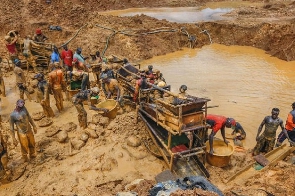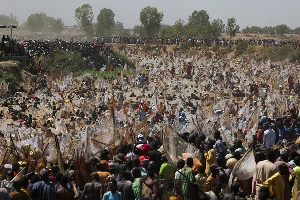The Eastern Nzema Traditional Council (ENTC) has tasked a seven-member committee to act as roving scouts to check galamsey activities that have polluted river bodies in their enclave.
The move formed part of concrete steps taken by the traditional council to abate the galamsey nuisance which had degraded lands and polluted river bodies which flow into the Greater Amanzule River at Azulenloanu and other communities in the Ellembelle District.
The committee is chaired by the Chief of Ambainu, Nana Nyamekeh Fofole, with the Chief of Azulenloanu, Nana Addo Nreda VI, the Chief of Bakanta, Nana Aka Nwoza III, and Chief of Nkroful, Nana Kwasi Kutuah V. as members.
The rest of the members are, the Chief of Teleku-Bokazo, Nana Afful Kwaw II, the Divisional Chief of Kikam, Nana Etease II and the Chief of Esiama, Nana Ainoo-Kwagyan III.
Among the terms of reference, the committee is tasked to inspect galamsey sites in various communities with the help of drones and slap injunctions on communities found culpable of the menace.
As part of the move, the committee is also expected to undertake thorough investigations and nip in the bud, galamsey operations which were having rippling effects on the Greater Amanzule River in recent times.
Speaking to Ghana News Agency at his palace in Ambainu, Nana Nyamekeh Fofole expressed wary that galamsey activities in the area had devastated lands and river bodies making the future bleak for posterity.
Nana Nyamekeh Fofole lamented that the upsurge in galamsey activities had far-reaching consequences such as drinking polluted and poisonous water with cyanide, lead and mercury.
The Chairman explained that since upstream river bodies such as Rivers Subri, Broma, Ebi and Fienza meandered their way through communities such as Ebi, Tandane, Asasetre, Nvenlesolo, Bomoakpole, Anwia, Teleku-Bokazo, Nkroful and Esiama before they finally entered the Greater Amanzule River at Azulenloanu, Bakanta and Ambainu, the committee would patrol all those areas as part of the operations.
The traditional ruler said the Council was vehemently opposed to galamsey activities and had made several moves to stop it.
He warned communities which were neck deep in galamsey activities to halt the practice and find viable alternative livelihoods such as rubber plantation, skills training, and other self-employable skills to make a living.
Nana Addo Nreda VI, the Chief of Azulenloanu where the Greater Amanzule River entered the sea, acknowledged that the colour of the river had changed in recent times.
According to him, there were no galamsey activities going on in the Greater Amanzule proper but attributed the pollution of the river to rivers from neighbouring communities such as Ebi, Tandane, Asasetre, Bomoakpole, Anwia, Teleku-Bokazo, Nkroful among others.
Nana Addo Nreda VI lamented that some detractors have tagged him to be involved in galamsey in the Greater Amanzule but denied it flatly, adding that he was opposed to galamsey.
He said the Greater Amanzule River had been the source of livelihood for people within the catchment area for decades and Nananom would fish out the culprits and bring them to book.
Nana Addo Nreda VI said fighting galamsey had become difficult due to political interferences, adding that the power of traditional rulers had been de-emphasized.
Nana Addo Nreda VI alleged that open galamsey activities were ongoing along the Teleku-Bokazo to Anwia main road in broad daylight but that the police had failed to arrest such Galamseyers.
He was happy with the constitution of the committee and stressed that it would help clamp down on all illegal miners in the district.
The Greater Amanzule River is a source of drinking water to many communities, it is also noted for its eco-tourist potential and wetlands conservation as well as a source of livelihood for indigenes and those in the diaspora.
Regional News of Thursday, 30 November 2023
Source: GNA













